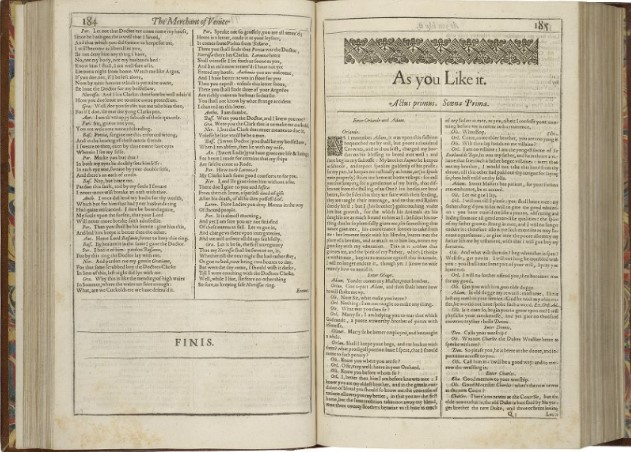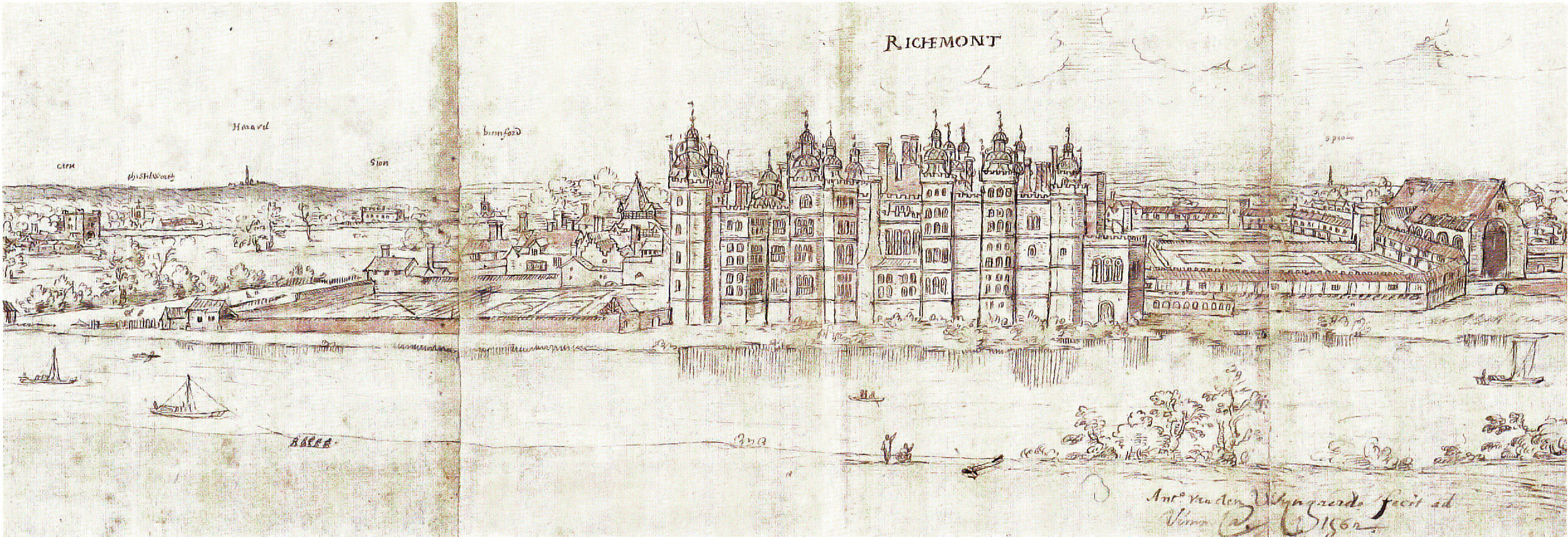1 Context
The phrase As You Like It is ambiguous. Here are four possible interpretations. Can you think of some more?
- You can like this play if you want to.
- This play is how you like plays to be.
- This play has a happy ending, the way you like it.
- This is a difficult play—understand it any way you like.
This ambiguity isn’t a product of Elizabethan English. It’s a Shakespearean enigma which alerts us to the multi-layered texture of As You Like It. In these chapters we’ll trace some of the strands that make up this complex texture.
Editions
Shakespeare died in 1616, and no copy of As You Like It survives from his lifetime. All modern editions are based on the version that begins on folio 185 of the 1623 First Folio. The Folger Publishing Shakespeare website allows users to play virtually with the First Folio and to read the earliest surviving text of As You Like It.

The Playwright
Shakespeare was in his mid-thirties when he wrote As You Like It. He was Anne Hathaway’s husband and the father of their three children, one of whom, Hamnet (the only boy), had died suddenly, possibly from the bubonic plague, in August 1596. Hamnet was eleven when he died.
Shakespeare’s theatre company, the Chamberlain’s Men, performed As You Like It when love was the central theme of Shakespeare’s comedies and tragedies. It belongs to the decade of A Midsummer Night’s Dream (1595-96), Romeo and Juliet (1596-97), The Merchant of Venice (1596-98), Much Ado about Nothing (1598), and Twelfth Night (1601-1602).
In this same decade Shakespeare wrote most of the 154 sonnets that express his passionate love for a young man and a ‘dark lady.’ Neither of these has been identified.
Dating and Early Performances
Because of a casual note written on a flyleaf of the Stationer’s Register, we know that As You Like It existed as a play by 1600. Most scholars accept that it was first acted between 1598 and 1600.
In her 2006 edition of the play, Juliet Dusinberre suggests that the first performance of As You Like It was on 20 February 1599, before Queen Elizabeth I and her court at the palace of Richmond (37).

Most early performances of As You Like It would have been at the Globe Theatre on London’s Bankside, the disreputable south bank of the Thames. Shakespeare is said to have acted the role of the old retainer Adam in these performances.
Dusinberre supports the tradition that Shakespeare’s company, boosted by royal patronage and renamed the King’s Men, entertained Elizabeth’s successor King James I with As You Like It on 2 December 1603. The venue was Wilton House near Salisbury in the south of England, where the court had moved to escape the bubonic plague then raging in London. This setting survives today, and it was indeed luxurious.
Later performance records for As You Like It are scarce. Following the likely staging at Wilton House, the earliest documented performance took place at the Theatre Royal in Covent Garden, London, in 1740. This production helped make As You Like It one of the most popular English plays of the eighteenth century. Since then countless stage and screen productions continuing to the present have made it one of the best known globally of Shakespeare’s plays. Many major actresses have attempted the role of Rosalind (See The Oxford Companion to Shakespeare, Dobson 27) The Folger website displays paintings, sketches, engravings and photographs of actors dressed for various roles in different eras.

Intended Audiences
The main characters in As You Like It are upper class and the play is designed to entertain educated and courtly audiences. However, the songs, music and processions of costumed actors, the sometimes violent action, the fights with and threats from animals, the prospective battle in Act 5, and the many puns and jokes will entertain all audience levels. You only have to be human to like this play!
Genres
As You Like It lifts audiences from their everyday reality into a world of magic and joy. Shakespeare explores ideas important to the conduct of life as well as less serious concerns. For the playgoers of Shakespeare’s time as for us, reality included epidemics, famine and war. Moreover, despite our technology-based resources—film, TV, Internet, Facebook etc. etc.—boredom was as much of a problem for the Elizabethans and Jacobeans as it is for us. Accordingly, As You Like It is nothing if not entertaining.
The plot consists of a wild mixture of literary types, or genres. These are comedy, romance, satire, pastoral and masque. A pastoral is a work of art focused on shepherds and shepherdesses. A masque is a courtly play involving poetry, music, dance and elaborate spectacle. Ben Johnson, the playwright and poet, and Inigo Jones, the architect of the Banqueting House, Whitehall, created many masques for King James and his wife Queen Anne.
We’ll find examples of all these genres as they occur in the discussions that follow. Partly as a result of its intermingling of genres, As You Like It has a unique Shakespearean texture.
What’s not to like?
In 1959, the respected English critic Helen Gardner published an essay on As You Like It entitled “Let the Forest Judge.” Gardner described it as “this radiant blend of fantasy, romance, wit and humour”, and declared, “This is a play to please all tastes” (158).
In 1998, the widely published American critic Harold Bloom argued that Shakespeare’s plays helped to shape Western notions of what it means to be human. He wrote: “As You Like It is a vitalising work, and Rosalind is a joyous representation of life’s possible freedoms. The aesthetic representation of happiness demands a complex art: no drama of happiness has ever surpassed Rosalind’s” (211).
Our discussion in the chapters that follow traces the qualities that Gardner and Bloom praise in As You Like It, namely:
| radiance | joy |
| freedom | fantasy |
| romance | wit |
| beauty | humour |
| happiness | drama |
We’ll also discover many of the ideas about humans, their lives and relationships, that Shakespeare invites audiences and readers to consider. Topics include love, sex, marriage, morals, temperaments, sibling rivalry, women’s friendships, life’s stages, the shortness of life, Fortune versus Nature, and country versus city life. Love is nevertheless the central interest, and on this subject, As You Like It debates a wide range of attitudes and approaches.
An Internet search will uncover many images and descriptions of actors’, directors’ and costumiers’ interpretations of As You Like It. Like the performers who, since 1599, have presented the play in so many diverse shapes, you’re encouraged to make a new and fresh interpretation, one that expresses your unique personal understanding of the characters, plot and themes. The only limitation is that your interpretation shouldn’t contradict any of the clues provided by the text. Your creation of an original new response needs to be based on knowledge of the play.
Modern Printed Editions
You’ll find an annotated and illustrated text of As You Like It in the Cambridge University Press series, edited by Cynthia Marshall, published in 2019. Annotations explain allusions and offer simple modern equivalents for Elizabethan words and expressions, and for Shakespeare’s creative language.
If you would like to know more about the early printings of As You Like It, I recommend that you read Shakespeare without Print by Paul Menzer.
additional reading
These link to holdings in the James Cook University Library. Please check your own library for these resources.
Barber, Cesar Lombardi, and Stephen Greenblatt. Shakespeare’s Festive Comedy: A Study of Dramatic Form and Its Relation to Social Custom, New ed., Princeton University Press, 2011, https://doi.org/10.1515/9781400839858.
Bryson, Bill. Shakespeare : The World as a Stage. Atlas Books/Harper Perennial, 2008.
Bourne, Claire, et al. Shakespeare / Text: Contemporary Readings in Textual Studies, Editing and Performance. Bloomsbury Publishing, 2021.
Ingman, Heather. The Student’s Guide to Shakespeare. Edinburgh University Press, 2017, https://doi.org/10.1515/9781474413527.
Menzer, Paul. Shakespeare without Print. Cambridge UP, 2023.
Palfrey, Simon. Doing Shakespeare. 2nd ed., Arden Shakespeare, 2020, https://doi.org/10.5040/9781408160466.
Shakespeare, William. As You Like It. Edited by Cynthia Marshall. Cambridge UP, 2019.
Smith, Emma. The Cambridge Shakespeare Guide. Cambridge UP, 2012, https://doi.org/10.1017/CBO9780511667442.
West, William. As If: Essays in As You Like It. Punctum Books, 2020, https://doi.org/10.21983/P3.0162.1.00

